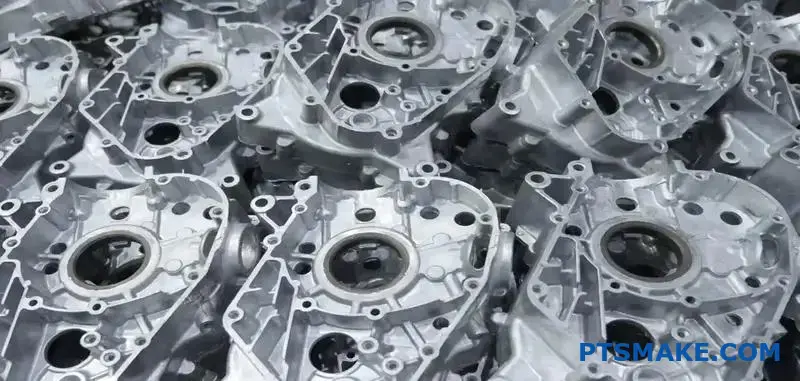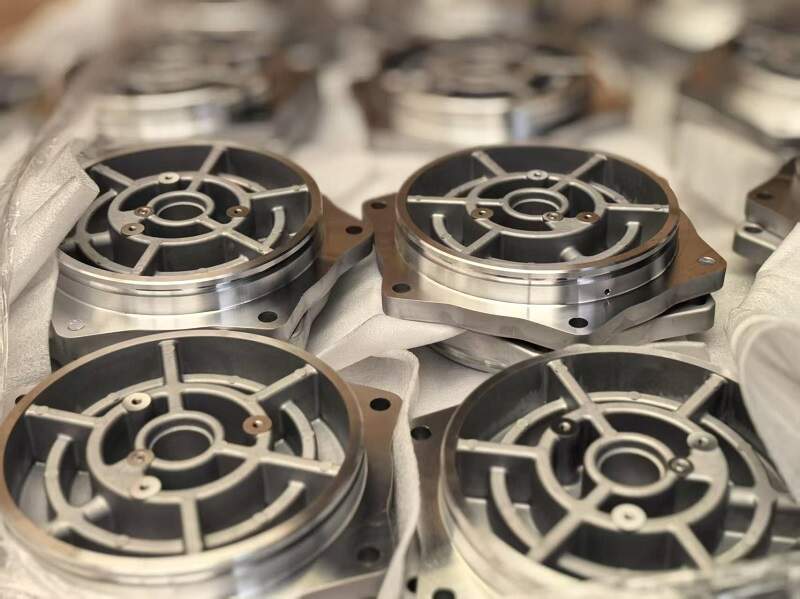Exploring the Role of Factory Solutions in Progressing Modern Design Solutions
Foundry services are vital in forming modern-day engineering options - Aluminum Casting Company. They link the space in between traditional manufacturing methods and the needs of contemporary markets. With innovations in automation and sustainability, foundries are developing to fulfill the needs of fields such as aerospace and vehicle. This improvement increases questions concerning the effects for products, procedures, and future technologies. What difficulties and opportunities exist ahead for foundry solutions in this swiftly altering landscape?
The Evolution of Shop Solutions in Design

The combination of computer-aided style (CAD) and simulation software application has actually revolutionized the style and manufacturing procedures, enabling foundries to produce complicated geometries with higher accuracy. In addition, the shift towards eco-friendly practices has resulted in the fostering of greener technologies and recycling efforts within factories. As sectors increasingly prioritize modification and quick prototyping, shop solutions have actually expanded their capabilities, ensuring they stay vital factors to the engineering landscape. This evolution underscores the foundry's critical role in supporting developments across various sectors, consisting of automotive, aerospace, and power.
Trick Processes and Techniques in Modern Foundries
Modern foundries employ a selection of crucial processes and techniques that enhance the effectiveness and quality of steel casting. Amongst these, sand casting stays prevalent as a result of its convenience and cost-effectiveness. The usage of innovative innovations, such as computer-aided style (CAD) and computer-aided manufacturing (WEB CAM), permits specific modeling and production, guaranteeing high precision in element dimensions. Furthermore, investment spreading is favored for creating complex geometries with superb surface area finishes.
Furthermore, automation and robotics boost production rate and consistency while reducing labor costs. Strategies like additive manufacturing are increasingly incorporated to produce detailed molds and cores, thereby lessening product waste. The application of thermal evaluation aids in optimizing spreading procedures by regulating and predicting solidification habits. Jointly, these processes and strategies exhibit exactly how modern factories are adapting to fulfill the needs of modern engineering obstacles, making sure superior product quality and functional efficiency.
The Significance of Products Selection in Factory Providers
Selecting the ideal products is crucial in foundry solutions, as it directly influences the mechanical homes, longevity, and total performance of the final item. Various products possess one-of-a-kind features, such as tensile strength, corrosion resistance, and thermal stability, which should line up with the desired application of the actors parts. As an example, metals like aluminum and steel are often chosen for their strength-to-weight ratio, while alloys can improve certain efficiency characteristics.
Furthermore, the choice procedure includes thinking about elements such as manufacturability, schedule, and cost, which can significantly impact project timelines and spending plans. Additionally, innovations in product scientific research allow the development of ingenious compounds and specialized alloys that cater to arising engineering difficulties. Consequently, a detailed understanding of product properties and their ramifications is vital for engineers and factory professionals to attain successful end results in their projects. This mindful selection procedure inevitably enhances the dependability and efficiency of the end products.
Factory Providers in Aerospace and Automotive Applications
Factory solutions play a necessary duty in the aerospace and automotive industries, where accuracy and performance are vital. These fields count greatly on the manufacturing of complex components that need to fulfill extensive high quality standards and withstand extreme conditions. Factories supply critical services such as spreading, machining, and ending up, making sure elements are light-weight yet durable, crucial for boosting fuel efficiency and security.
In aerospace, foundry services add to the production of generator blades, engine parts, and structural parts, all of which need detailed layouts and high-performance products. Likewise, in the automotive field, shops provide engine blocks, framework parts, and transmission situations, concentrating on toughness and weight decrease.
Advanced factory techniques, consisting of additive manufacturing and accuracy spreading, are significantly used to satisfy the specific demands of these sectors. By using tailored options, factory services assist drive technology and preserve competitive advantages in the fast-evolving aerospace and automotive landscapes.
Innovations Driven by Factory Capabilities
Various technologies in design are sustained by the advanced abilities of shop services. These solutions make it possible for the production of complicated geometries and high-performance materials that are vital for modern applications. Additive production, commonly understood as 3D printing, has seen considerable advancements through factory methods, enabling for the rapid prototyping of elaborate styles. Furthermore, the ability to cast lightweight alloys has changed industries such as aerospace and auto, resulting in enhanced gas performance and performance.
In addition, factories are significantly incorporating smart modern technologies, such as automation and data analytics, to enhance production effectiveness and quality assurance. These advancements not just reduce waste but also enable customization at range, satisfying the certain needs of clients. By leveraging innovative foundry capacities, engineers can discover new frontiers in item design and capability, eventually driving progression across different industries and developing a structure for future innovations.
Future Patterns in Shop Solutions and Design Solutions
The future of foundry services is shaped by arising patterns such as sustainable production techniques, which focus on environmental duty. Automation and wise technologies are readied to enhance performance and accuracy, while increasing modification and flexibility will fulfill the advancing needs of customers. As these trends develop, they will certainly redefine the landscape of engineering remedies in the factory sector.
Lasting Manufacturing Practices
As industries progressively prioritize ecological responsibility, lasting manufacturing practices within shop solutions are becoming redirected here vital to contemporary design options. These practices concentrate on lessening waste, decreasing energy intake, and making use of environment-friendly materials throughout the production procedure. By executing strategies such as recycling scrap metal and optimizing melting Extra resources procedures, shops can especially lower their carbon footprint. In addition, the adoption of life process analyses allows makers to evaluate the environmental influence of their items from beginning to disposal. Working together with distributors committed to sustainability additionally boosts the efficiency of these initiatives. Eventually, accepting lasting production not only straightens with global environmental goals but also fosters technology and competition in the quickly advancing design landscape.
Automation and Smart Technologies
While numerous sectors are embracing technological innovations, foundry services are experiencing a considerable improvement via automation and smart innovations. The assimilation of robotics and automated systems boosts production effectiveness, minimizes human mistake, and accelerates the manufacturing process. Smart technologies, such as IoT and AI, enable real-time tracking and anticipating upkeep, which maximize operational performance and lessen downtime. These improvements help with data-driven decision-making, permitting shops to react swiftly to market needs and enhance product quality. Additionally, automation reduces labor costs and improves work environment safety and security by handling hazardous tasks. As factory services remain to take on these technologies, they are positioned to redefine engineering options, causing enhanced competitiveness and sustainability in the production market.
Personalization and Versatility Trends
Arising patterns in foundry solutions significantly highlight modification and adaptability to meet unique client needs. This shift shows a wider demand for customized design options that adapt to specific job requirements and market requirements. Business are buying sophisticated modern technologies, such as additive production and digital modeling, allowing them to produce personalized parts efficiently and cost-effectively. Consequently, foundries are moving far from one-size-fits-all methods, supplying clients the capacity to modify layouts and materials in real-time. Furthermore, collaboration in between engineering groups and foundry services is coming to be more integrated, promoting innovation and increasing time-to-market. This trend not only boosts item efficiency but likewise sustains sustainability by minimizing waste with specific manufacturing processes.
Often Asked Inquiries
What Are the Normal Prices Related To Foundry Services?
Typical expenses connected with factory services consist of material costs, labor costs, look at more info tools usage costs, and expenses costs - Aluminum Foundry. These expenses can differ commonly based on project complexity, volume, and specific demands of the engineering solution included
Exactly how Lengthy Does the Shop Refine Generally Take?
The foundry procedure generally takes anywhere from numerous weeks to a few months, depending upon aspects such as intricacy, product needs, and production volume, which can greatly affect timelines and overall task delivery.
What Industries Advantage A Lot Of From Shop Services?
Industries such as automotive, aerospace, and construction benefit considerably from factory solutions. These markets rely upon accuracy spreading and metal manufacture to produce intricate parts, boosting product performance and operational efficiency in their respective applications.
What Certifications Should Shops Have?
Shops ought to have qualifications such as ISO 9001 for top quality management, ISO 14001 for ecological monitoring, and certain market certifications like AS9100 for aerospace or IATF 16949 for auto, making sure conformity and quality control.
How Do Foundries Make Sure Top Quality Control in Their Processes?

Foundry solutions are vital in forming contemporary engineering services. As design techniques have actually progressed, the role of foundry solutions has transformed considerably to satisfy progressing market needs. As markets increasingly focus on customization and fast prototyping, shop services have actually broadened their capacities, guaranteeing they stay important factors to the engineering landscape. As industries significantly prioritize environmental responsibility, lasting manufacturing methods within foundry services are ending up being crucial to modern design options. In addition, collaboration between design groups and factory services is ending up being much more incorporated, fostering innovation and speeding up time-to-market.